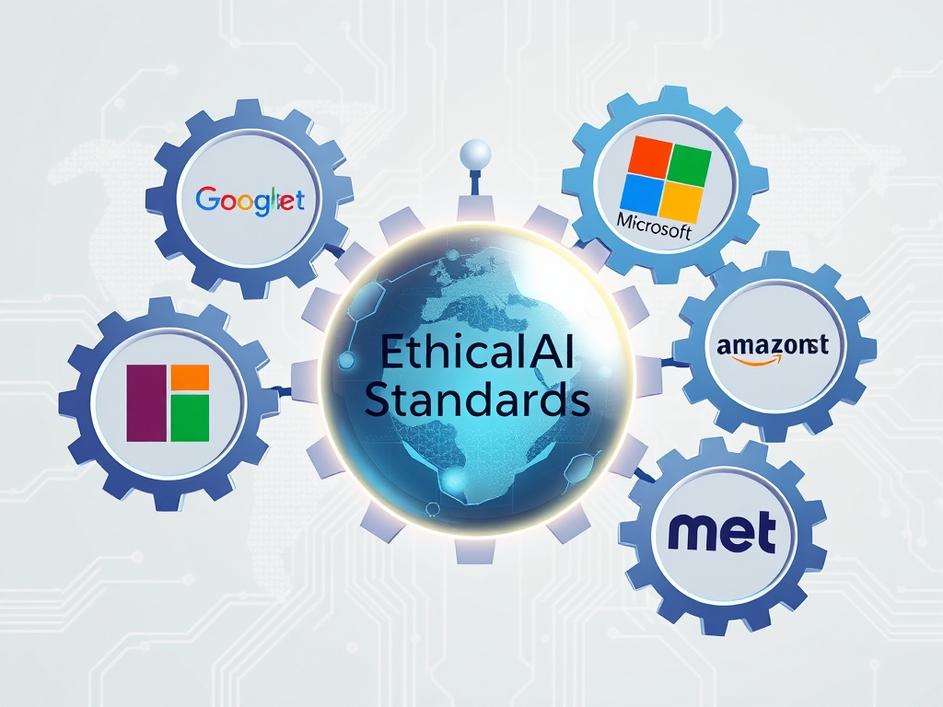


We are a digital agency helping businesses develop immersive, engaging, and user-focused web, app, and software solutions.
2310 Mira Vista Ave
Montrose, CA 91020
2500+ reviews based on client feedback

What's Included?
ToggleSo, picture this: some of the biggest tech companies in the world – we’re talking Google, Microsoft, Amazon, Meta – usually fierce rivals, have decided to team up. And not just for a new gadget or a quick business deal. They’ve formed a global alliance with a really ambitious goal: to set common rules for how AI should be built and used ethically and safely. This isn’t just a small announcement; it’s a huge moment. For years, we’ve heard whispers and outright shouts about the potential dangers of AI, from privacy concerns to bias in algorithms. Now, the very companies driving this technology are saying, "Okay, let’s get serious about this together." It makes you stop and think, doesn’t it? Is this a genuine turning point, or is there more to the story?
You have to wonder, what sparked this sudden urge for unity among competitors? It’s not just a coincidence. For a while now, there’s been a lot of worry from everyday people, experts, and governments about AI getting too powerful, too biased, or just plain out of control. We’ve seen news stories about facial recognition going wrong, AI models reflecting human prejudices, and concerns about how much data these systems gobble up. Plus, governments around the globe are starting to draw up laws and regulations for AI, and nobody in Big Tech wants to be caught off guard or have wildly different rules for every country. So, part of this alliance probably comes from a genuine understanding that they need to get ahead of these issues. But another part might just be good old-fashioned business sense: better to shape the rules yourself than have someone else do it for you.
When these tech giants talk about standardizing "ethical AI," what does that actually look like? It’s not just a fuzzy concept. It means creating clear guidelines. Think about things like ensuring AI systems don’t treat different groups of people unfairly because of how they were trained. It means being transparent about how an AI makes decisions, so we don’t feel like we’re dealing with a black box. It means putting safeguards in place to protect our private information. And it definitely means having humans in the loop, especially when AI makes big decisions. The alliance plans to set up groups to work on these specifics. They want to create a kind of benchmark, or maybe even a "seal of approval," that tells everyone an AI product meets certain ethical and safety standards. That’s a huge undertaking, considering how complex AI already is.
While the idea of ethical AI standards sounds great on paper, it’s also important to be a little critical. Can these huge companies, who are constantly fighting for market share and talent, truly agree on a single, universal definition of "ethical"? What’s ethical in one culture might not be in another. And let’s be honest, there’s always the concern that this could be a form of "ethics washing." That’s when companies make a big show of being ethical without truly changing their core practices, mostly to improve their public image or to avoid stricter government oversight. There’s also the worry that such an alliance, dominated by the biggest players, might inadvertently set standards that are too hard for smaller, innovative startups to meet. This could create even higher walls in the tech world, making it tougher for new ideas to emerge outside the established giants. It’s a delicate balance, trying to ensure safety without stifling innovation or competition.
From where I stand, this alliance is a really important step. It shows a growing awareness within the tech industry that they can’t just build amazing tools without thinking deeply about the consequences. It’s a sign that the conversation about responsible AI is finally hitting the mainstream, even among those who create it. But we shouldn’t get ahead of ourselves and think this is the end-all, be-all solution. Real ethics don’t just come from a committee of corporations. They need input from all kinds of people: academics, civil rights advocates, governments, and everyday users. This alliance could set a good baseline, a starting point for better practices. But the true ethical development of AI will require constant vigilance, public pressure, and a willingness from *everyone* to keep pushing for AI that truly serves humanity, not just corporate interests or technological advancement for its own sake. It’s a journey, not a destination, and we all have a part to play in keeping these giants accountable.
The announcement of this global alliance, while significant, is just the beginning of what will undoubtedly be a long and complex journey. Crafting these standards will involve countless debates, compromises, and a whole lot of technical work. It won’t be easy to get every company on the same page, especially when their business models might benefit from different approaches. We also need to consider how these standards will be enforced. Will there be independent auditors? What happens if a company doesn’t follow the rules? These are big questions that still need answers. This initiative offers a glimmer of hope that the powerful forces behind AI are starting to take collective responsibility, but we, as consumers and citizens, must remain engaged. Our voices and concerns are what truly drive the conversation forward and ensure that AI develops in a way that truly benefits all of us, not just a select few.
Ultimately, the future of AI isn’t just in the hands of these tech giants. While their alliance is a powerful signal, the ethical landscape of artificial intelligence is a shared responsibility. It requires ongoing dialogue, not just among corporations, but with researchers, policymakers, and the public. We need to keep asking tough questions, demanding transparency, and advocating for systems that prioritize human well-being and fairness. This alliance could either become a genuine cornerstone for responsible innovation or a clever shield against external regulation. Which path it takes will depend on the sincerity of its members and, crucially, on how much we, the users and the affected public, continue to pay attention and demand real accountability. Let’s hope this is a true turning point, pushing AI toward a future where it genuinely helps build a better world for everyone, not just a more efficient one for a few.



Comments are closed